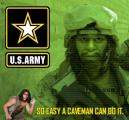
Originally Posted by
nascar88

BLUF: Leave the advisory role to SF.
If we have to resort to having SMs volunteering for multiple deployments to get what they want or need, then we have an issue. We aren't considering mental health, emotional health, and family stability. Most SMs over in both theaters are on 3rd, some 4th deployments when we still have senior leadership with "slick sleeves." So, in a sense, we'd rather just go ahead and make Major's "KD." And make it a command for LTCs?? What???!!!
Coming from a BN MiTT in Diyala, the team chief Major's position is simply a SSG Squad Leader. Bottom line. My team chief was a SF guy and he'll be the first to say it. So, my team chief already had an ODA and did the advisory role, and now we're saying he doesn't need to command an SF company? Even though he did a Captain's job? Come on.
The LTC position on a BDE MiTT has only 10 personnel to include the LTC. Again, Squad Leader. The team chief is only in charge of nine personnel, and has no command authority over HN forces. The team chief and the team only ADVISE, not command. No UCMJ authory over anyone except for their team, they can only get THTs involved to have HN leadership removed.
Moving on...a lot of MiTT guys have already been accepted to SFAS and been told they cannot report until after the MiTT. Why not send these guys to SFAS, then the Q-Course and get them properly trained in HN advising? From FT Riley, to Kuwait, to the Phoenix Academy in Taji were we ever told to read FM 31-20-3. My team chief made us read it, and it is the best piece of literature for the job besides the COIN manual.
Training...most SF ODA commanders are all the same, have the same goals and set their successor for success through area studies. Of course, again, our team was the only team to do this and it helped our incoming team understand the AO, intelligence, etc. Big difference between their team chief and mine. Incoming team chief wanted to save the world, while my team chief knew it would take time and had to be smart about it. We ran intel, we ran sources, and we did all we could to advise, but no one ever read his daily sitreps. They were more concerned with timeliness of reporting than what was in the report. It takes a special person to advise, someone who is patient and doesn't do the, "well, when I was in Baghdad," and not everyone can do advising. Going back to what I said before...let the guys go to SFAS, Q Course and get trained.
And lastly...our IA battalion was on their SIXTH MiTT. Why? With each MiTT the BN should get better, right? I bet if area studies had been done that wouldn't be the case. SF cancels ODAs if the HN Army gets better. Am I making sense? Sending more MiTTs with no analysis continues the vicious cycle.










Bookmarks